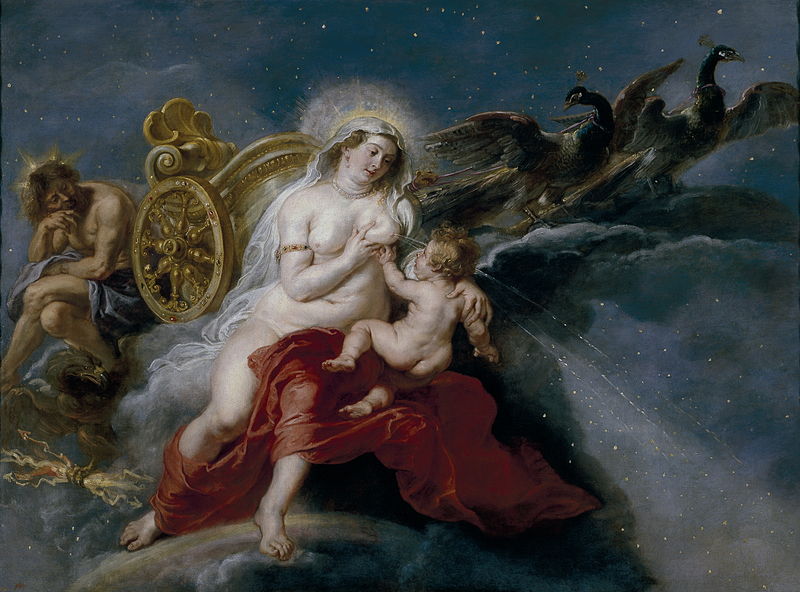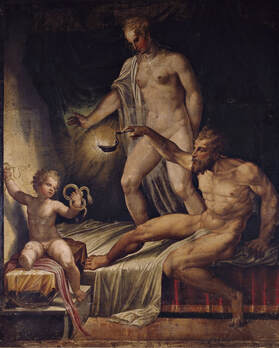HERACLES IN GREEK MYTHOLOGY
The Life and Death of Heracles
Who was Heracles?
Heracles was the greatest of all Greek mythological heroes. A demi-god son of Zeus and Alcmene, the myths surrounding Heracles intertwined with many other tales from Greek mythology, and as a result the chronological order for the life of Heracles is a confusing one, and it is virtually impossible to reconcile all of the myths.
Heracles Conceived
|
The story of Heracles, although of Perseus’ family line, begins not in Mycenae or Tiryns, the cities of Perseus, but instead begins in Thebes.
Here, Alcmene, granddaughter of Perseus, by Electryon, and Amphitryon, grandson of Perseus, by Alcaeus, found refuge after the death of Electryon. Amphitryon would rage war against the Teleboans and Taphians to avenge the death of Alcmene’s brothers; a war in which Amphitryon was successful. |
|
The day before Amphitryon returned from his campaign, Zeus came to Thebes, attracted by the beauty of Alcmene. Zeus disguised himself as Amphitryon, and slept with Alcmene. This of course resulted in Alcmene falling pregnant, and also resulted in a very confused Amphitryon, when he was informed that he had returned the day before.
Amphitryon and Alcmene would find out the truth of what had happened when they consulted the seer Tiresias.
Amphitryon and Alcmene would find out the truth of what had happened when they consulted the seer Tiresias.
The Birth of HeraclesWhen the time neared for Alcmene to give birth, Zeus proclaimed that on the given date, one of the House of Perseus would be born, a boy destined to rule.
Hera thus discovered that her husband had been unfaithful, again, and so Hera plotted her revenge. Hera would make Zeus promise that his proclamation could not be changed. Hera then involved Eileithyia, the Greek goddess of Childbirth in her scheme. Nicippe, the wife of Sthenelus, was then induced to give birth early to her son, Eurystheus, whilst Alcmene was delayed from giving birth. Thus, Eurystheus became the member of the House of Perseus who would rule. Heracles was born the next day, whilst his half-brother, Iphicles, the son of Alcmene and Amphitryon was born the day after. A half-sister, Laonome, would be born later. Some say that Heracles was at this point called Alcaeus, after Amphitryon’s father. |
|
Heracles abandoned
Alcmene was fearful about what Hera might do to her family if the newborn boy stayed alive, and so Alcmene abandoned Heracles outside the walls of Thebes.
Zeus had been keeping a close eye on his son, and Athena was in place to rescue him. Athena took the newborn boy up to Mount Olympus, and there, mischievously, presented the boy to Hera. Hera would begin to breastfeed the newborn child, but when Heracles suckled to hard, a gush of breast-milk flew across the cosmos, and the Milky Way was created.
Heracles was now well nourished, and Athena took him back to Alcmene, all Alcmene now knew that her son might have an enemy in Hera, but other gods and goddesses were looking out for her son.
Zeus had been keeping a close eye on his son, and Athena was in place to rescue him. Athena took the newborn boy up to Mount Olympus, and there, mischievously, presented the boy to Hera. Hera would begin to breastfeed the newborn child, but when Heracles suckled to hard, a gush of breast-milk flew across the cosmos, and the Milky Way was created.
Heracles was now well nourished, and Athena took him back to Alcmene, all Alcmene now knew that her son might have an enemy in Hera, but other gods and goddesses were looking out for her son.
Heracles and the SnakesIt may have been at this point that Heracles gained his named; Heracles meaning “Glory of Hera”. This was done in an attempt to placate the goddess.
Hera though now sought to kill her husband’s son, and whilst Heracles was no more than one year of age, two serpents were sent by the goddess to the nursery of Iphicles and Heracles. The cries of Iphicles awoke Alcmene and Amphitryon, and yet when Amphitryon entered with sword drawn, he found the danger gone, for Heracles had strangled the two serpents. |
|
|
Colin Quartermain - Heracles - 13th March 2022

